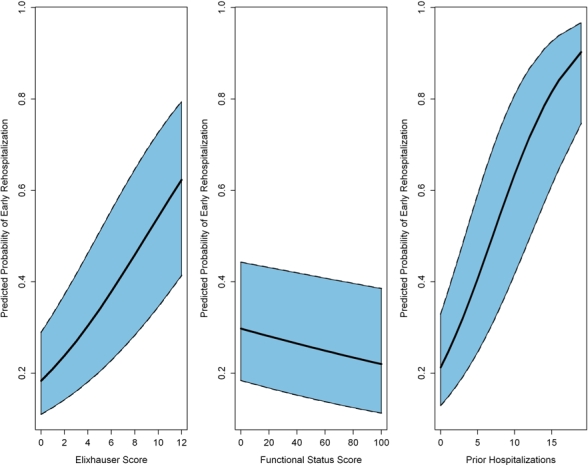Metrics of Global Health Status Signal Early Hospital Readmission Risk After Kidney Transplantation
1Medicine, Division of Nephrology, University of Pennsylvania, Philadelphia, PA
2Pediatrics, Children's Hospital of Philadelphia, Philadelphia, PA
3Medicine, Division of Geriatrics, University of Pennsylvania, Philadelphia, PA.
Meeting: 2015 American Transplant Congress
Abstract number: 202
Keywords: Kidney transplantation, Outcome
Session Information
Session Name: Concurrent Session: Kidney: Hospitalization/Readmission
Session Type: Concurrent Session
Date: Monday, May 4, 2015
Session Time: 2:15pm-3:45pm
 Presentation Time: 2:51pm-3:03pm
Presentation Time: 2:51pm-3:03pm
Location: Room 118-AB
Background: Early (≤30 days) hospital readmission (EHR) after kidney transplantation (KT) is common, with diverse causes that likely include poor pre-KT health status. Transplant providers are in need of metrics that signal poor health on the waiting list and increased risk of EHR after KT. We explored alternative summary measures of pre-transplant health status that may improve the identification of KT recipients at risk for EHR.
Methods: We linked data from a national dialysis provider to Organ Procurement and Transplantation Network and Medicare datasets and performed a retrospective cohort study of 10,164 adults on dialysis who received KT from 6/12/2000 – 6/13/2010. EHR was defined as admission to an acute care facility within 30 days of discharge from KT. Our primary exposures were 1) pre-KT Elixhauser Comorbidity Index, 2) pre-KT physical function (PF) measured by the Short Form-36 Instrument, and 3) number of hospitalizations in 12 months before KT.
Results: Median age was 52 years (interquartile range [IQR] 41, 60); 34% were black race and 63% were male. Median wait time was 2.2 years (IQR 1.1-3.5). 26% of KT recipients experienced an EHR event; median time to EHR was 9 days. After multivariable adjustment, pre-KT burden of Elixhauser comorbidity claims, poor PF, and pre-KT hospitalization frequency were all independently associated with EHR. Recipients who were hospitalized more than once in the 12 months prior to KT were at substantially higher risk of EHR (adjusted odds ratio 1.69, 95% CI 1.5-1.9).
Conclusions: Three summary measures of pre-KT global health status were independently associated with EHR after KT. Transplant providers may find pre-KT hospitalization frequency, an easily measured metric, to be particularly useful in risk-stratifying KT recipients at discharge and improving the transition of care.

To cite this abstract in AMA style:
Harhay M, Hill A, Wang W, Even-Shoshan O, Mussell A, Karlawish J, Bloom R, Feldman H, Silber J, Reese P. Metrics of Global Health Status Signal Early Hospital Readmission Risk After Kidney Transplantation [abstract]. Am J Transplant. 2015; 15 (suppl 3). https://atcmeetingabstracts.com/abstract/metrics-of-global-health-status-signal-early-hospital-readmission-risk-after-kidney-transplantation/. Accessed March 2, 2026.« Back to 2015 American Transplant Congress
